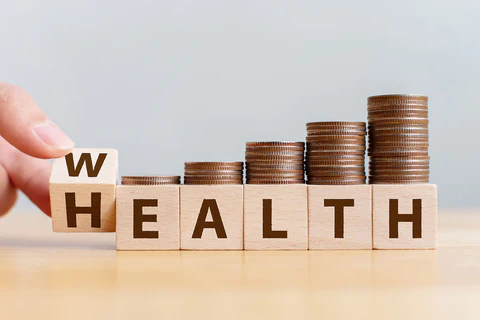If you had to name a valuable asset, what’s the first thing that would come to mind? For most people, it would be something tangible – like gold, Apple stock, paintings by European masters, or real estate in Central Park West. But what about education, experience, loyalty, or happiness? While these types of intangible assets won’t appear on a company balance sheet, there’s no denying their value. You can’t sell them. But when it comes to landing well-paid jobs, receiving promotions, and being willing and able to work hard, they’re priceless. That’s where the adage “health is wealth” enters the picture. A paraphrase of the Roman poet Virgil’s famous comment that “the greatest wealth is health,” the idea is that our physical and mental well-being are arguably the most valuable assets of all.
What Does “Health Is Wealth” Mean?
At its core, “health is wealth” means that your physical and mental well-being is far more important than wealth in the realm of life satisfaction. It’s saying, “Yes, money is great. It can solve many problems and lead to a fantastic quality of life. But in the absence of good health, it means very little.” In other words, don’t pursue wealth to the detriment of well-being! After all, you can’t enjoy the financial fruits of your labor if you’re in constant pain, unable to move, struggling to breathe, going to the hospital every few months, or worrying about your health…or dead. Only if you’re well can you take full advantage of your wealth.
What’s more, staying healthy is also crucial to reaching your full financial potential.
The Financial Importance of Physical and Mental Health
“Health is wealth” reminds us that these two vital components of a happy life are interconnected. Indeed, numerous studies have shown that higher socioeconomic status usually leads to improved health prospects. But the opposite is also true. If your health suffers, then so do your finances. Here’s how:
- Being Sick Is Expensive: It doesn’t matter whether you’re suffering from a broken leg or a bad bout of depression. Being sick has costs attached. For example, you might not be able to work, and you only have so many paid sick days to take (unless you’re self-employed, in which case you might not have any). You may even have to quit your job. Either way, your income suffers, which can lead to a host of additional money problems.
- Healthcare Costs: Medical bills can drain your savings and put you in debt. Regular check-ups, prescriptions, and unexpected health issues all add up. Without good health, you’re constantly battling financial setbacks due to medical expenses.
- Productivity and Earning Potential: When you’re healthy, you can work efficiently, meet deadlines, and pursue career growth. Poor health affects your productivity, leading to missed opportunities and reduced earning potential.
- Emotional Well-Being: Mental health is wealth too. Anxiety, stress, and depression impact decision-making, relationships, and overall life satisfaction. These emotional struggles can spill over into financial decisions and stability.
Prioritize Health for Long-Term Prosperity
In the pursuit of wealth, don’t neglect your health. Prioritize self-care, exercise, mental well-being, and preventive measures. Remember that true wealth encompasses more than money—it includes vitality, happiness, and the ability to enjoy life. So, lace up those sneakers, eat your veggies, and invest in your well-being. After all, a healthy life is the ultimate treasure! 🌟🏃♀️
Dominic is an experienced banker known for delivering friendly service and personalized attention to all customers. He contributes a major role in achieving branch sales goals by recommending products and services that meet customer needs with his solid knowledge of banking regulations and procedures for protection of cash and other assets.

